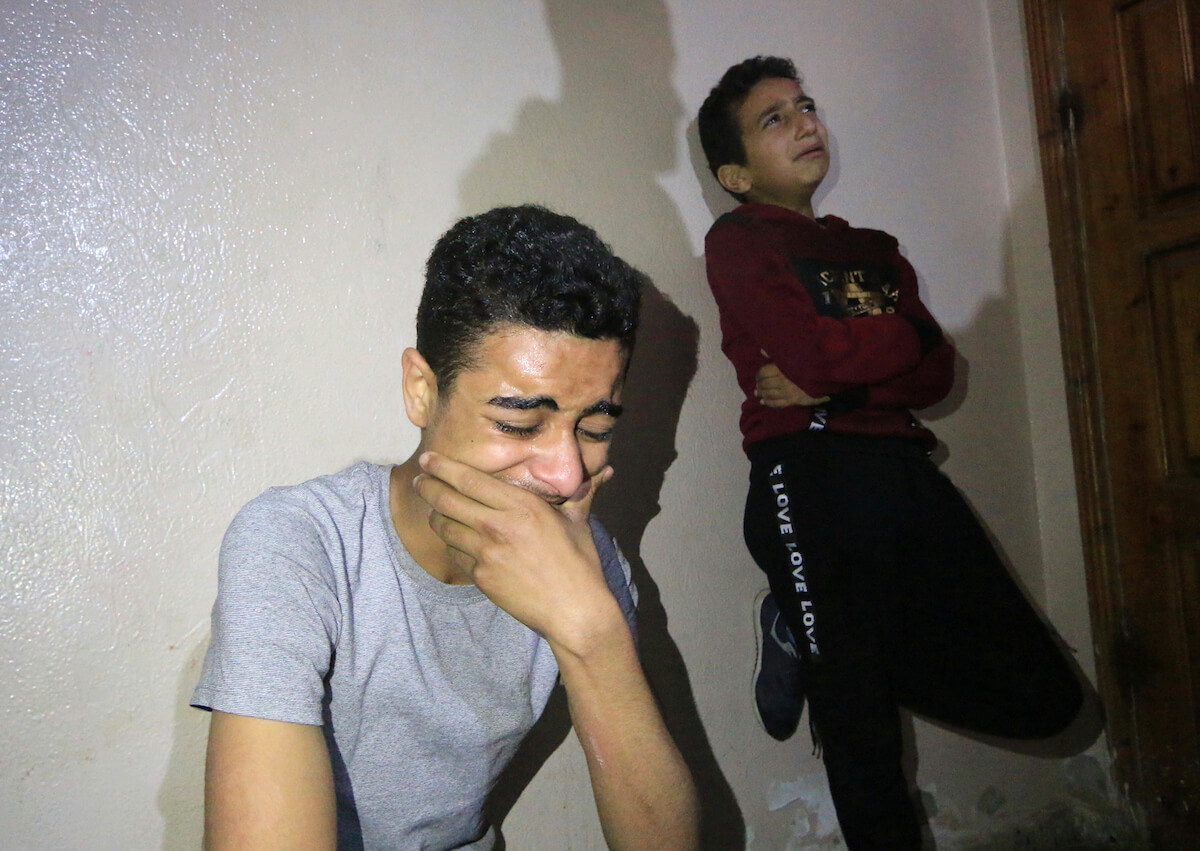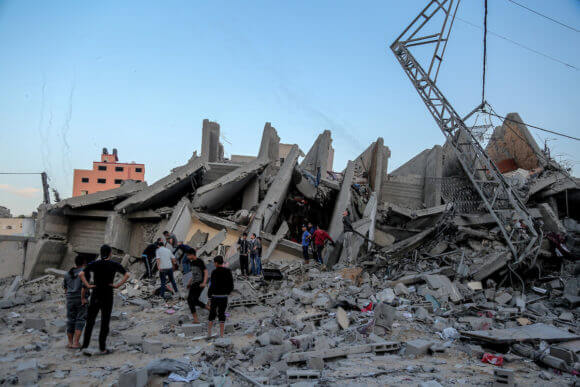One of the worst flare ups in violence across the Israeli-Gaza borders continued to escalate on Sunday, as Israeli air forces pounded more than 300 sites in the Gaza Strip, while Hamas forces in Gaza fired hundreds of rockets into Israeli territory.
As of Sunday afternoon, reports from the Palestinian Health Ministry in Gaza indicated that 25 Palestinians, including a four-month and 14-month-old girl, two pregnant women, and a 12-year-old boy were killed in the strikes.
The ministry added that over 150 Palestinians, including several children, were injured during the Israeli airstrikes.
At least four Israelis have been killed by rocket fire from Gaza.
Palestinians in Gaza have been claiming that Israeli forces have overwhelmingly targeted civilian buildings, leading to fears that the situation could spiral farther out of control than any other flare up in recent months.
Despite several of the dead being identified as civilians, and videos circulating on social media showing residential buildings being bombed, Israeli forces and officials have maintained that they are striking “terror targets.”
The Israeli army has published a series of infographics and statements on Twitter over the weekend, claiming to have hit over 320 “terror sites,” including tunnels, rocket launch sites, and weapon storage facilities.
They highlighted the targeted killing of an alleged Hamas operative responsible for transferring Iranian money into Gaza that was used to help “fund their rocket fire at Israelis.”
Palestinian media reported that the killing of the man, identified as Ahmed al-Khodary, was Israel’s first targeted assassination of a high profile official in Gaza since 2014.
In regards to the killing of 37-year-old pregnant woman Falastine Abu Arar and her 14-month old niece Saba, the Israeli army denied its role in their death, instead blaming a misfiring of a Palestinian rocket.
One of the buildings destroyed by Israel was home to the Gaza bureau of the Turkish state-run Anadolu news agency.
“We call on the international community to act swiftly in order to ease tensions that have increased due to Israel’s disproportionate actions in the region,” the Turkish Foreign Ministry said in a statement.

Netanyahu promises ‘massive strikes’
As the death toll continued to climb on Sunday, Israeli Prime Minister Benjamin Netanyahu ordered the continuation of “massive” airstrikes on Gaza following a meeting with his security cabinet.
Netanyahu also ordered reinforcements of ground troops, including “tanks, artillery and infantry forces” along the Israeli land borders with Gaza, stoking fears of a possible ground invasion.
“Hamas is responsible not only for its attacks against Israel, but also for the Islamic Jihad’s attacks, and it is paying a very heavy price for it,” Netanyahu said.
Meanwhile, officials of the different armed factions in Gaza vowed to “extend” their response, should the Israeli airstrikes continue.

“Our response will be broader and more painful in the event [Israel’s] extends in aggression, and we will remain the protective shield of our people and our land,” the groups said in a statement, according to Al Jazeera.
Shaky ceasefire talks
At around 11:30 pm local time on Sunday, Haaretz, citing diplomatic sources, reported that the UN along with Egypt and Qatar had presented a cease fire proposal to the Israelis.
Several media outlets reported that ceasefire negotiations were being held with Palestinian officials in Egypt.
“A Hamas source says great efforts have been made in recent hours to achieve calm. The decision is in Israel’s hands, the source was cited as saying by the Al-Miyadin television channel,” Haaretz reported before midnight
By midnight local time, the Times of Israel reported that Hamas leadership had approved the cease fire proposal, set to go into effect at midnight.
Israeli officials have yet to confirm if they have accepted the cease fire.
UN Special Coordinator for the Middle East Peace Process Nickolay Mladenov called for calm in a statement, saying “continuing down the current path of escalation will quickly undo what has been achieved and destroy the chances for long-term solutions to the crisis.”
“This endless cycle of violence must end, and efforts must accelerate to realise a political solution to the crisis in Gaza,” he said.
The Guardian quoted Jeremy Stoner, the Middle East regional director for Save the Children as saying “we may have entered the most serious stage in this crisis since the 2014 Gaza war.”
“We echo the UN special coordinator for the Middle East peace process call on all parties to immediately de-escalate the situation,” Stoner said.
How it began
The latest tensions come amid an already volatile situation in Gaza, following the year-long Great March of Return protests on the border and several similar flare-ups over the past few months.
Amid fears of violent anniversary Great March of Return protests at the end of March, Israeli and Hamas officials struck a deal: Hamas would control protests and stop rocket fire in exchange for an easing of the siege, expanding the fishing zone off Gaza’s coast, and allowing Qatari aid money into the territory.
But just days after expanding the fishing zone to 15 nautical miles, Israel scaled it back down on April 30th, citing alleged rocket fire.
Days later, on Friday, Israeli forces killed four Palestinians in a single day: two during Great March of Return protests on the borders, and two in an airstrike targeting a Hamas military post.
Al Jazeera reported that prior to the the barrage of rocket fire coming out of Gaza, Israeli forces conducted a drone attack that left three Palestinians injured.
Israeli forces maintain their strikes have been “retaliatory” in nature.



As usual, NPR’s David Green brings on a Jewish guest (joseph fetterman) to give both the Israeli and Palestinian perspective.
David, as usual tried to portray the Gaza fishing industry as “rather large.”
Restricted to inshore fishing where the majority of the catch are low value sardines, the total catch per year is 3200 tons, this amounts to about 3 pounds of sardines per person per year.
Wow, David Green…that seems like a rather small fishing industry.
After removing the head, guts, bones and scales, that leaves each person 1 1/2 pounds of fish to feast on for the whole year.
A ratio of 1 Israeli dead to 6 Palestian? The Zionists aren’t finished yet.